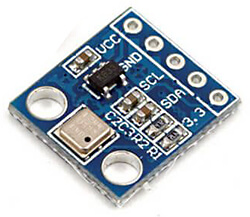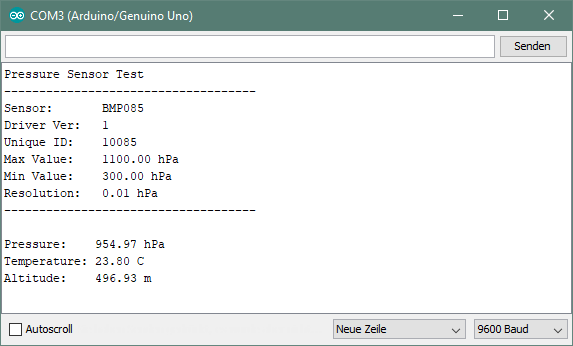

| Pin | Pin-Funktion | Arduino Uno |
|---|---|---|
| VCC | Stromversorgung | 3,3V |
| GND | Masse/Ground | GND |
| SCL (CL) | I²C clock | A5 |
| SDA (DA) | I²C data | A4 |
| 3.3 | Stromversorgung | 3,3V |

Hinweis: 1hPa (Hektopascal) = 100Pa = 1mbar = 0,001bar
Im ersten Versuch habe ich die Library SFE_BMP180 von LowPowerLab verwendet und dies ist die Ausgabe auf der seriellen Konsole:

// change this to your altitude (float value)
#define ALTITUDE 482.0
#include <Wire.h>
#include <SFE_BMP180.h>
SFE_BMP180 pressure; //Creating an object
void setup()
{
Serial.begin(9600);
if (!pressure.begin()) {
Serial.println("BMP-180 init failed!");
while(true);
}
Serial.print("Provided altitude: ");
Serial.print(ALTITUDE, 0);
Serial.println(" meters");
}
void loop()
{
char status;
double T, P, p0; //Creating variables for temp, pressure and relative pressure
status = pressure.startTemperature();
if (status != 0) {
delay(status);
status = pressure.getTemperature(T);
if (status != 0) {
Serial.print("Temperature: ");
Serial.print(T, 1);
Serial.println(" °C");
status = pressure.startPressure(3);
if (status != 0) {
delay(status);
status = pressure.getPressure(P, T);
if (status != 0) {
Serial.println("Pressure measurement: " + String(P) + " hPa (Pressure measured using temperature)");
p0 = pressure.sealevel(P, ALTITUDE);
Serial.println("Relative (sea-level) pressure: " + String(p0) + " hPa");
}
}
}
}
delay(5000);
}Hier wurden neben "Wire.h" noch die beiden Bilbiotheken Adafruit_Sensor und Adafruit_BMP085_Unified verwendet, die ein recht brauchbares Ergebnis liefern, wie die serielle Konsole zeigt:

#include <Wire.h>
#include <Adafruit_Sensor.h>
#include <Adafruit_BMP085_U.h>
/* This driver uses the Adafruit unified sensor library (Adafruit_Sensor),
which provides a common 'type' for sensor data and some helper functions.
To use this driver you will also need to download the Adafruit_Sensor
library and include it in your libraries folder.
You should also assign a unique ID to this sensor for use with
the Adafruit Sensor API so that you can identify this particular
sensor in any data logs, etc. To assign a unique ID, simply
provide an appropriate value in the constructor below (12345
is used by default in this example).
*/
Adafruit_BMP085_Unified bmp = Adafruit_BMP085_Unified(10085);
void setup(void)
{
Serial.begin(9600);
Serial.println("Pressure Sensor Test");
if(!bmp.begin()) {
Serial.print("No BMP-085/BMP-180 detected");
while(true);
}
displaySensorDetails();
}
void loop(void)
{
/* Get a new sensor event */
sensors_event_t event;
bmp.getEvent(&event);
/* Display the results (barometric pressure is measure in hPa) */
if (event.pressure)
{
/* Display atmospheric pressue in hPa */
Serial.print("Pressure: ");
Serial.print(event.pressure);
Serial.println(" hPa");
/* Calculating altitude with reasonable accuracy requires pressure *
* sea level pressure for your position at the moment the data is *
* converted, as well as the ambient temperature in degress *
* celcius. If you don't have these values, a 'generic' value of *
* 1013.25 hPa can be used (defined as SENSORS_PRESSURE_SEALEVELHPA *
* in sensors.h), but this isn't ideal and will give variable *
* results from one day to the next. *
* *
* You can usually find the current SLP value by looking at weather *
* websites or from environmental information centers near any major *
* airport. *
* *
* For example, for Paris, France you can check the current mean *
* pressure and sea level at: http://bit.ly/16Au8ol */
/* First we get the current temperature from the BMP085 */
float temperature;
bmp.getTemperature(&temperature);
Serial.print("Temperature: ");
Serial.print(temperature);
Serial.println(" C");
/* Then convert the atmospheric pressure, and SLP to altitude */
/* Update this next line with the current SLP for better results */
float seaLevelPressure = SENSORS_PRESSURE_SEALEVELHPA;
Serial.print("Altitude: ");
Serial.print(bmp.pressureToAltitude(seaLevelPressure, event.pressure));
Serial.println(" m\n");
} else {
Serial.println("Sensor error");
}
delay(5000);
}
/**
* Displays some basic information on this sensor from the unified
* sensor API sensor_t type (see Adafruit_Sensor for more information)
*/
void displaySensorDetails(void)
{
sensor_t sensor;
bmp.getSensor(&sensor);
Serial.println("------------------------------------");
Serial.print ("Sensor: "); Serial.println(sensor.name);
Serial.print ("Driver Ver: "); Serial.println(sensor.version);
Serial.print ("Unique ID: "); Serial.println(sensor.sensor_id);
Serial.print ("Max Value: "); Serial.print(sensor.max_value); Serial.println(" hPa");
Serial.print ("Min Value: "); Serial.print(sensor.min_value); Serial.println(" hPa");
Serial.print ("Resolution: "); Serial.print(sensor.resolution); Serial.println(" hPa");
Serial.println("------------------------------------");
Serial.println("");
delay(1000);
}